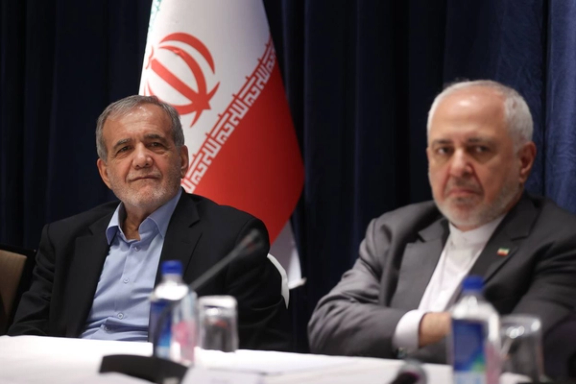Critics accuse Pezeshkian of constant retreat as rivals close in

Nearly five months after Iran's ultraconservatives lost the country's presidential election to reformist-backed Masoud Pezeshkian, hardliners led by the Paydari Party are still trying to weaken the new government.
In the latest bid to strike a significant blow against President Pezeshkian, Kamran Ghazanfari, a member of the Paydari faction, issued a stern threat. He warned that if the president refuses to dismiss his strategic affairs vice president and former foreign minister, Javad Zarif, the ultraconservatives are determined to unseat Pezeshkian and push for a court sentence of at least 15 years in prison.
Paydari's opposition to Zarif appears to stem from allegations that his children hold US citizenship, which, in their view, disqualifies him from holding any high-profile position in Iran.
Reacting to the threats, three high-profile ‘reformist’ figures spoke to Khabar Online website and dismissed Paydari's threat as a "bluff." Nuclear physicist and occasional commentator Ahmad Shirzad dismissed Kamran Ghazanfari's remarks, stating that "statements from someone like Ghazanfari should not be taken seriously." He added that the ultraconservative lawmaker's pseudo-legal argument, citing the Sensitive Jobs Act, is nothing more than wishful thinking.
Former ‘reformist’ Roads Minister Ahmad Khorram recalled that Zarif had previously stepped down from the government under similar threats, only to return after Supreme Leader Ali Khamenei indicated he had no objections to his presence in the government.
Khorram emphasized, "Pezeshkian is the system's last winning card. Everyone should unite to help him solve the country's problems. This is no longer a time for hostility and provocation."
Meanwhile, prominent cleric and ‘reformist’ politician Mohammad Ali Abtahi said that the Paydari Party is holding a grudge against the Pezeshkian government and warned that if they manage to get rid of Zarif, he will not be the last one to be targeted by such threats."
In another development, a reformist journalist, Ahmad Zeidabadi opined in a sarcastic comment that three problems will be solved if hardliners really send Pezeshkian's case to the court and manage to jail him.
"First, they'll spare Pezeshkian the ordeal of navigating a political minefield, allowing him to spend his remaining years in the comfort of a prison cell. Second, the citizens who voted for him will no longer face criticism from their compatriots. And third, with the regional crisis at its peak, maybe an ultraconservative government can tackle Iran’s problems more efficiently—so they might as well reveal the ‘savior’ they claim to have up their sleeve," Zeidabadi remarked.
Meanwhile, in a commentary on Rouydad24 website, Iranian journalist Davud Heshmati wrote that the Pezeshkian administration seems to be undecided between holding its own social base or bribing its political rivals.
Commenting on Pezeshkian's conciliatory approach toward the ultraconservatives, Heshmati argued that the president's "national reconciliation" agenda appears to be little more than a retreat as his political rivals advance.
Heshmati also noted that "Pezeshkian came to power in an election with minimal voter turnout, leaving his government vulnerable. To stabilize his administration, Pezeshkian must focus on strengthening his social base and stop his pattern of constant retreat."
Lately, Pezeshkian has appointed several hardline politicians as provincial governors and to other government posts, a move that has angered ‘reformist’ groups who backed him in the election against strong conservative rivals. Although the president says his decisions stem from principal of national unity, critics accuse him of making political concessions to hardliners, calling it horse trading.
Mohammad Mohajeri, a prominent commentator allowed to speak on state-controlled media said, "A faction of Pezeshkian’s rivals believes that if he truly supports the idea of national unity, he should appoint governors from the opposing faction in provinces where he received fewer votes. However, this could turn into a "melon peel" under his feet, potentially causing the government to slip and stumble."